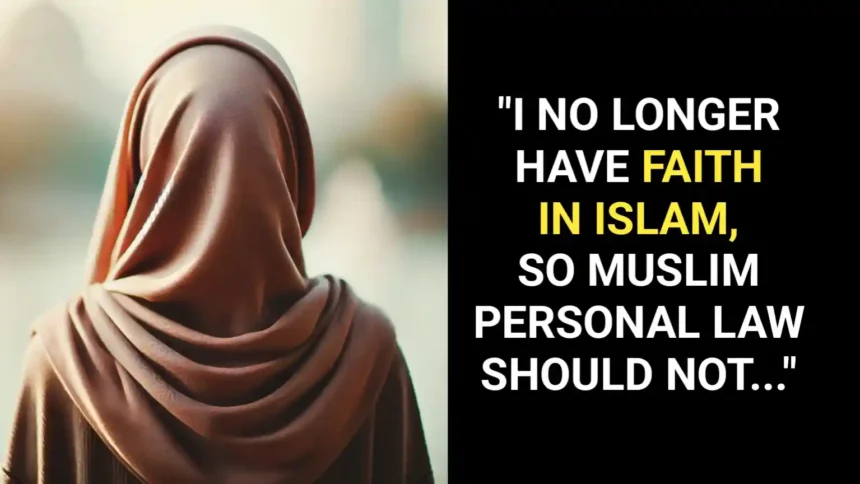A woman from Kerala has approached the Supreme Court, seeking exemption from Muslim personal law in matters of inheritance. Safiya, the petitioner, argues that though she was born into a Muslim family, but does not follow Islam and that’s why she is not be bound by Sharia law. the petitioner wants the Indian Succession Act, 1925, to apply to her inheritance rights instead.
The Supreme Court, acknowledging the complexity of the issue, has issued a notice to the central government, asking for its stand. A bench led by Chief Justice Sanjiv Khanna, along with Justices Sanjay Kumar and K.V. Viswanathan, is hearing the case.
I no longer have faith in Islam, so Muslim Personal Law should not apply to me
Safiya, from State of Kerala, who identifies as a non-believer, has not formally renounced Islam but does not follow its teachings. Under Islamic inheritance law, she is entitled to only one-third of her father’s property, while the remaining two-thirds would go to male heirs. She wants her father to have the legal right to leave her his entire estate, which is not allowed under Sharia law.
Her petition raises a crucial legal question: Should those who no longer believe in Islam still be subjected to its personal laws? Safiya argues that Article 25 of the Constitution, which guarantees religious freedom, should also include the right to not follow any religion. She insists that her fundamental rights are being violated by being forced to adhere to a faith-based legal system she does not recognize.
Supreme Court’s Response and Legal Implications
During the hearing, Chief Justice Khanna pointed out that this issue isn’t just about one religion. If ex-Muslims are allowed to opt out of Sharia law, similar provisions may be needed for people from other faiths who leave their religion. He also noted that in Hindu inheritance law, a person who converts out of Hinduism may lose certain succession rights.
The court has given the central government four weeks to submit its response. Solicitor General Tushar Mehta, representing the Centre, acknowledged that the case raises important legal questions and sought time to file a detailed reply.
Women’s Rights in Islamic Inheritance
The case highlights a long-standing debate about gender disparity in Muslim inheritance laws. Under Sharia law, male heirs receive twice the share of female heirs. Many Muslim women have spoken out against this system, arguing that it limits their financial security and independence.
Safiya’s petition isn’t just about her personal rights—it could impact other Muslim women who want equal inheritance rights under India’s secular laws. If the Supreme Court rules in her favor, it may open the door for more women to challenge religious inheritance laws and seek protection under the Indian Succession Act.
What the Law Says
The Indian Succession Act, 1925, provides equal inheritance rights regardless of gender or religion, but it explicitly excludes Muslims under Section 58. This means that even if a Muslim does not practice Islam, they are still governed by Sharia law in matters of inheritance.
Safiya’s lawyer, Prashant Padmanabhan, has challenged the constitutionality of this exclusion, arguing that it forces individuals to follow religious laws against their will.
Personal Laws vs. Constitutional Rights
This case isn’t the first time India’s courts have debated the role of personal laws in a secular democracy. The Shayara Bano case (2017), which led to the abolition of triple talaq, was a landmark judgment where the Supreme Court ruled that personal laws cannot override fundamental rights.
Now, a similar question is being asked in the context of inheritance: Can a person be legally forced to follow religious laws if they no longer identify with that religion? The Supreme Court’s ruling in Safiya’s case could set an important precedent.
Centre submits reports to the supreme court
The case will be heard again in May 2025, after the Centre submits its response. The government’s position will be crucial in determining whether legal reforms are needed to address the concerns of individuals who leave their religion.
If the court rules in Safiya’s favor, it could challenge the long-standing dominance of religious laws over personal rights, potentially leading to a shift toward a uniform legal framework for inheritance.
For now, the case remains a focal point in the broader debate over personal laws, religious freedom, and gender justice in India. The final verdict could have implications not just for ex-Muslims, but for anyone seeking equal legal rights outside of religious frameworks.

